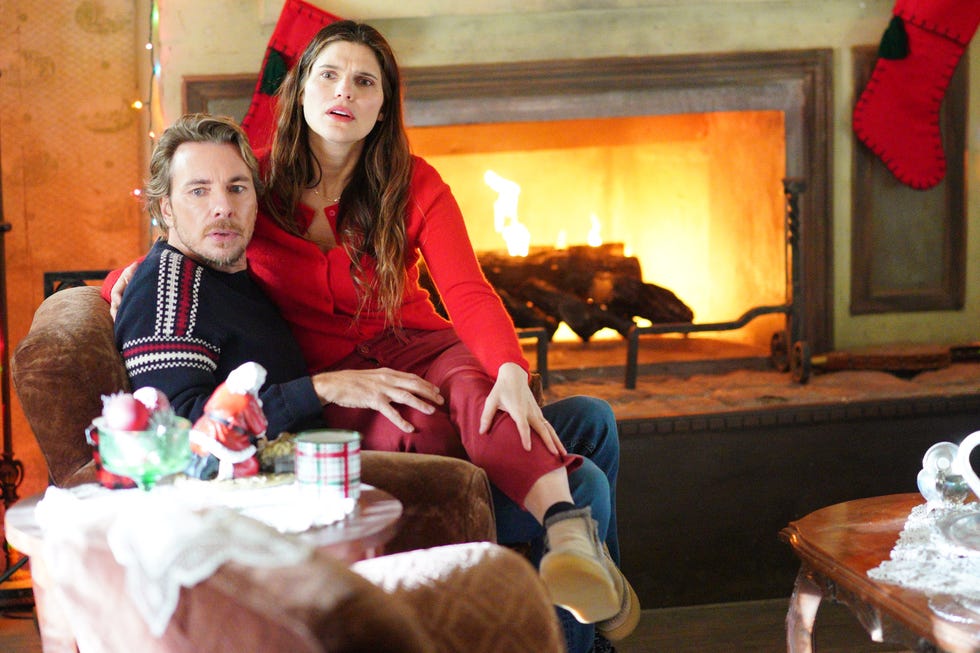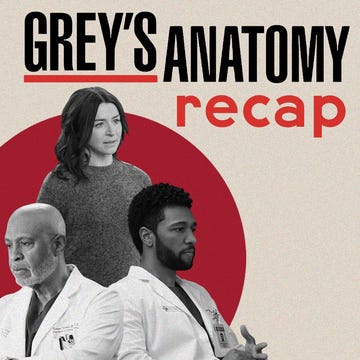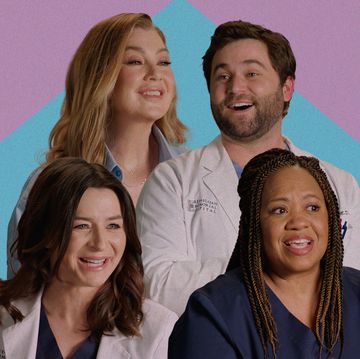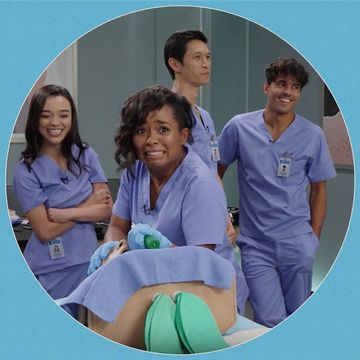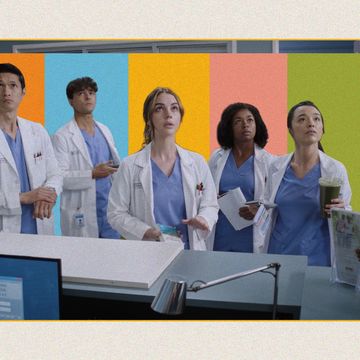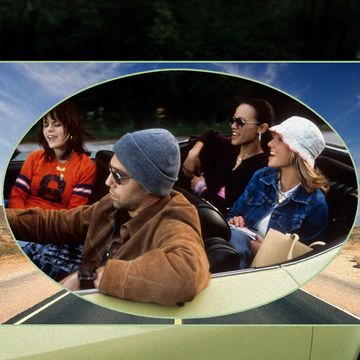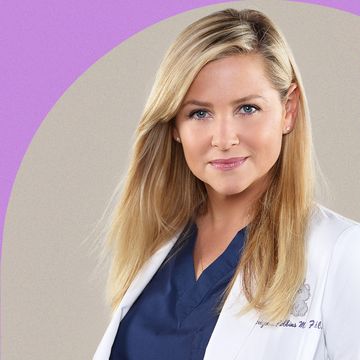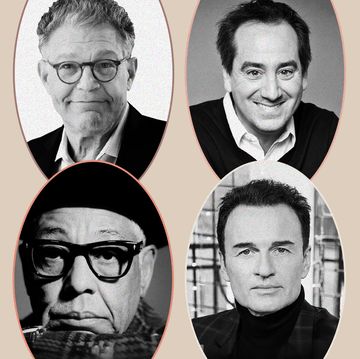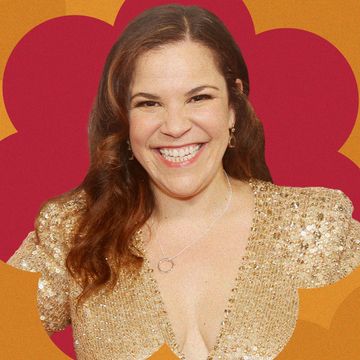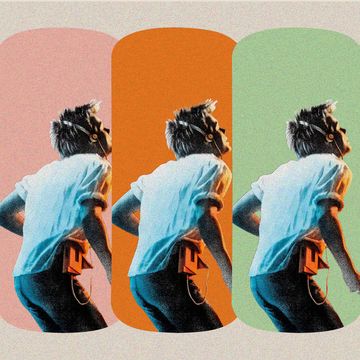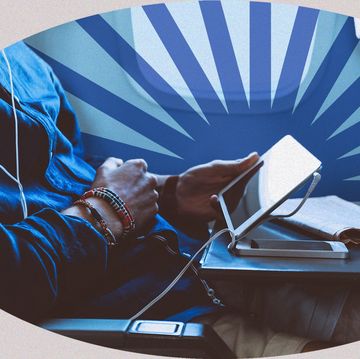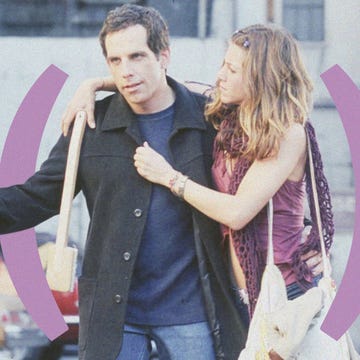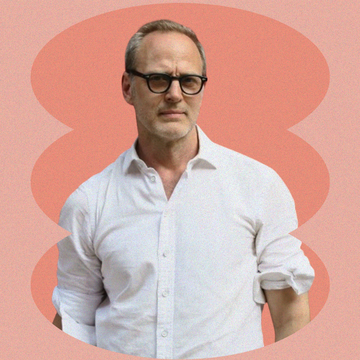Since she took the Sundance film festival by storm with her directing debut, In a World, which she also wrote and starred in, Lake Bell has continued to marry her creative talents with developing projects that express the wonderfully beautiful complications of real women.
Bell isn't afraid to play a girlfriend — see HBO's How to Make it America or, on the screwier end of that spectrum, Wet Hot American Summer — or a wife, but it's the way she insists on adding layers (flaws, vulnerability, agency) to those typically surface-level roles that give them gravitas and make them more than just supporting characters to men.
In her current ABC sitcom, Bless This Mess — which Bell again stars in, writes, and directs — she plays Rio, who, along with her husband, Mike, moves to rural Nebraska from New York to start a simpler life as farmers. Of course, as the world of network comedy dictates, things don't quite go as planned.
Beyond the laughs, Bell and her co-star, Dax Shepard, imbue this hipster turned hay bailing couple with equal parts sweetness and earnestness as they work to determine what true commitment in a family means. It's easy to buy when you remember what Bell herself has been through in her own life with her children and husband, tattoo artist Scott Campbell.
As she told Shepard on his podcast Armchair Expert, “We had two home births. The first was with [daughter] Nova in Brooklyn. I felt very empowered … the home birth was this amazing primal bonding... When my daughter came out, she had the [umbilical] cord wrapped around her neck, and it was very scary. She was on my chest and she wasn’t breathing. The midwife gave her three lifesaving breaths on my chest and my husband was there. She came to life and we saw it.”
When it came time for their second child, who was born in 2017, her home birth took a turn for the worse. Like their daughter, their son, Ozzy, was born with his umbilical chord around his neck and not breathing, but when he didn't respond to attempts to revive him, the baby had to be rushed to the E.R.
“I was looking at my phone as they were sewing me up and I get a little video from Scott: little Ozzy just barely taking breaths with the oxygen mask and I just passed out," Bell recounted. "Because I was like, ‘He’s alive,’ and then I just passed out.”
Celebrities are normally reserved about sharing such trauma from their actual lives, but Bell has been open about her experience in order to demystify the act of home births. She also felt compelled to connect with other women about her experience.
As the second season of Bless this Mess takes its mid-season break, Bell spoke to Shondaland about coping with her trauma, how she's continued to channel her creative energy into acting, producing, and writing, and why she's more committed than ever to activism.
SUSAN HORNIK: As we’re now halfway through this season of Bless This Mess, how are you feeling as one of the show’s stars and an executive producer?
LAKE BELL: Because the show is wholly my charge, it’s satisfying on every creative level — in a writing space but also an editorial space and as an actor and executive producer. Being a mom of two young kids and being a wife and a friend, there's a lot on my plate, but I feel very grateful to have it. Bless this Mess is certainly a career priority — that said I can't help but be constantly in development. My brain is constantly nurturing other ideas and projects and resurrecting ideas I had from the past. It's just natural to my process.
SH: Have you drawn from the well of your own life while writing the show?
LB: Of course. And the other writers come to the room with their experiences. I think that’s the only way you can be authentic. It's also therapeutic. You can laugh about things [and] arguments in the past. I think writing comedy offers a safe space to discuss those things.
SH: Bless this Mess clearly deals with what makes and breaks relationships. In your opinion, what’s the key to a long-lasting relationship?
LB: I think therapy. I don't think you have to be deep in a relationship in order to benefit from therapy. Also, I'm not even just talking about couples therapy — I'm talking about singularly taking care of myself. Within a relationship, I think that's a core difference between success and failure. Whether your therapy could maybe fall under the lines of self-care, yoga, meditation or just your hobbies that you still honor. I feel like it's taking care of yourself singularly in order to be a unit.
SH: You and your co-costar, Dax Shepard both direct an episode, too. Do you guys share tips on that process since you've both done features?
LB: Yeah, absolutely. I think at this point we have a great camaraderie both professionally and personally...he’s such a smart actor and contributor to the show. He kept being, like, "Just giving me some something to blow up." I was like, "Wait. What? I don't know if — we'll work on it. You know, we'll work on it."
SH: You’ve been open about discussing the traumatic home birth you had with your son. What made you want to discuss it publicly?
LB: I have two children and I am very happy at that number. I don't traditionally like to talk about my private life. However, with the story about my son, I didn’t want to not talk about it just because it was traumatic. I felt I could provide a community for others who have been in similar situations — and I’ve felt honored to do that.
SH: What has it been like for you since sharing your story?
LB: Well, first I want to say that I did home birth twice with great conviction, love, and dedication — because you can't do a home birth unless you are dead set on it. You will take no other answer — you have to be so committed. I feel still that a healthy woman can give birth at home. I also honor and respect people who choose to be in a hospital because it is totally a personal decision. It's so emotional and personal, so it’s been interesting hearing from people who are for and against home births and what their personal reasons are.
For me, I am very proud for having my children at home. But also, from my first experience to my second experience, I should have been in a hospital for my second birth. There's sometimes no way to know that until it's too late. I am just very grateful that my little man, my little Ozzy, is safe and healthy and breathing and walking and talking. You can say shoulda, woulda, coulda, but it doesn't matter. You just look at the human that is sitting in front of you, being in the grass or whatever and mimicking what the dogs do and you're like, yeah, that's all that matters.
SH: You’ve talked about traveling a lot for work with your family. What do you do to make that less annoying?
LB: iPads for all! [Laughs] Look, I'm not like a spender. I'm not like, “Oh my God! I need that bag.” I have the same bags or I borrow my mom’s or my grandma’s. I just don't spend a lot of money naturally — unless it’s at the grocery store. But when I travel, that’s my only big expenditure. I would like to have first class if I can. When I travel with the kids, it's just too many. So, I just get four first class and you take over the whole section. We just create a little country over here.
SH: Outside of the show, what sort of activism are you working on now?
LB: I serve as a board member for Woman in Film, where we’re trying to forge ahead with gender parity by providing opportunity for mid-career women who have been forgotten. Getting women on the list of decision-makers and populate their network studios.
I also work with This Is About Humanity, which is profound and empowering in giving means and funds to different legal practices that are down in the trenches with immigration cases that are so beyond the means of what I understand. They also provide actual supplies to shelters and to detention centers, which is so important because sometimes the situation at the border feels like, “God, this is so overwhelming. How can we even help?” I know it's exhausting — it's exhausting for all of us, especially as a parent. It's overwhelming. But to tune it out is almost un-American. We’ve got to just work together. You can feel compassion for people who are seeking asylum and their families are being ripped apart. I think that's just being human.
I believe I am patriotic — I love this country and I feel like I believe that we are better than that. I have to have hope. I have to believe that we, with our powerful forces, can command good and can inspire good. Not just inspire it, but affect good.
Susan L. Hornik is a veteran entertainment and lifestyle journalist, with bylines in Men’s Health, LA Weekly, LA Times, and The Washington Times. While she lives in Los Angeles, her heart and soul will always remain in her hometown, New York. Follow her @slh2346
Get Shondaland directly in your inbox: SUBSCRIBE TODAY

